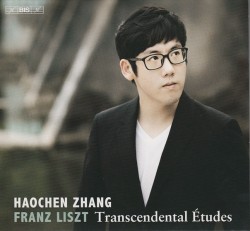 Franz Liszt – Transcendental Etudes
Franz Liszt – Transcendental Etudes
Haochen Zhang
BIS BIS-2681 (bis.se)
Liszt’s 12 Études d’exécution trancendante (or Transcendental Etudes) comprise perhaps the greatest documents of musical Romanticism, a high watermark in the history of the piano, amounting to nothing less than the creation of modern keyboard technique. That Haochen Zhang has even attempted these studies is a testament as much to his audacity as it is to the unbridled virtuosity that he displays in his performance of them.
These studies teem with such outrageous difficulties that, in their day (1831) they were the most difficult works for the piano; even now there’s but a handful of pianists who can play them authoritatively. Lazar Berman’s (Melodiya, 1963), Boris Berezovsky’s (TELDEC, 1996) and Leslie Howard’s (Hyperion, 2016) have always been considered benchmark recordings.
We must add Zhang’s exquisite recording to this short list. To play these works at all requires a formidable technique; to play them so as to convey their poetry rather than the effort required to play them is a gift afforded to very few. Clearly Zheng is one of those.
Throughout the performance of the 12 studies Zheng displays technical prowess to deal with the pyrotechnics required of a stellar performance of the works. He rises above mere gratuitous display of pianism to reach a plateau of intense emotional conviction – especially in the first four etudes. Moreover, he also knows how to enter the introspective core of such pieces as the beautiful Ricordanza and Harmonies du soir.



